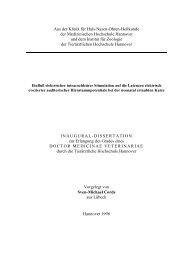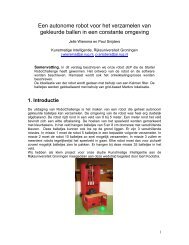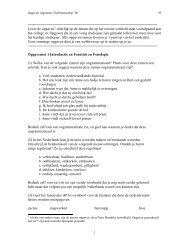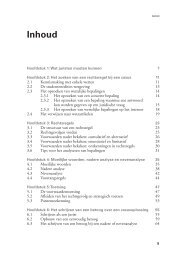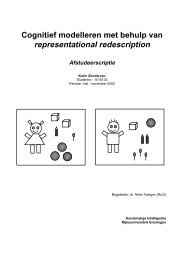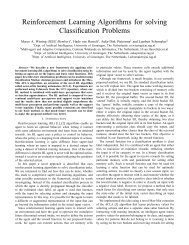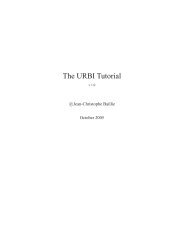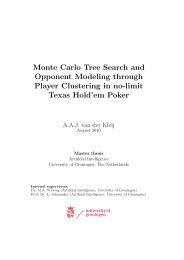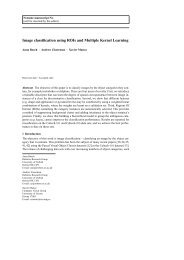Presuppositions in Spoken Discourse
Presuppositions in Spoken Discourse
Presuppositions in Spoken Discourse
You also want an ePaper? Increase the reach of your titles
YUMPU automatically turns print PDFs into web optimized ePapers that Google loves.
Chapter 6<br />
This section exam<strong>in</strong>es the opposite problem, th<strong>in</strong>gs that aren’t perceived as<br />
bridg<strong>in</strong>g but unfortunately would be treated as such if we consistently look for<br />
relationships such as those outl<strong>in</strong>ed <strong>in</strong> Table 10.<br />
If bridg<strong>in</strong>g NPs regularly have multiple anchors <strong>in</strong> the context, then are the<br />
def<strong>in</strong>ite NPs identified <strong>in</strong> the corpus as new characterized by their lack of<br />
relationships to the text? How new are those examples identified as new(N)? Look<br />
at the example below, where the speaker is describ<strong>in</strong>g how he prepares before he<br />
attends a play.<br />
(17) (3-5a 212)<br />
Speaker A: I sort of read A:[the play] before I go to see it usually. I like to study it a<br />
week before, and then take B:[my impressions] to the play...<br />
Here, B:[my impressions] was tagged by both annotators as new(N), though on<br />
reflection it is clear that it can be further modified as ‘the impressions I get from<br />
read<strong>in</strong>g a play before I go to see it,’ or ‘my impressions from the study of the play,’<br />
and could easily be considered to be bridged to A:[the play] or to the see<strong>in</strong>g event.<br />
Let’s exam<strong>in</strong>e another example.<br />
(18) (3-5a 49)<br />
Speaker A after . Murder <strong>in</strong> the Cathedral he wrote a - preface {didn’t he} of some<br />
sort say<strong>in</strong>g that - he was try<strong>in</strong>g to br<strong>in</strong>g {poetry} back <strong>in</strong>to [@m] .<br />
drama . but . I don’t th<strong>in</strong>k . he succeeded at all<br />
Speaker B you don’t<br />
Speaker A no . [ae?] I th<strong>in</strong>k you can tell <strong>in</strong> Murder <strong>in</strong> the Cathedral - especially [?i]<br />
you see if you’ve heard it [@m?@] I I once acted <strong>in</strong> Murder <strong>in</strong> the<br />
Cathedral . and [@m] . mean the A:[the poetry], especially the<br />
choruses really drives home <strong>in</strong> that - you can tell<br />
Here A:[the poetry] is tagged as new, but aga<strong>in</strong>, it could be related to many of the<br />
different semantic <strong>in</strong>dividuals or events <strong>in</strong>troduced <strong>in</strong> the previous discourse. This<br />
is similar for most of the examples tagged as new(N). And <strong>in</strong>deed, I re-exam<strong>in</strong>ed all<br />
the examples tagged as new(N) by both annotators and I have come to the<br />
conclusion that there are seldom examples that cannot be <strong>in</strong>terpreted either as 1)<br />
related to the earlier discourse, but <strong>in</strong> a way that is difficult to describe and predict,<br />
as <strong>in</strong> the example above, or 2) seems to be someth<strong>in</strong>g that is well known to the<br />
discourse participants, and here many of the examples of NPs modified by<br />
possessives can be found, such as references to “your application,” or “your little<br />
girl.” Also, “your English” is clearly related to the context of the discourse, and<br />
th<strong>in</strong>gs like “my father” are quite predictable. Possessives seem to be more<br />
<strong>in</strong>tegrated <strong>in</strong> the discourse record by their very nature than def<strong>in</strong>ite noun phrases<br />
because they not only <strong>in</strong>troduce a new object/<strong>in</strong>dividual, but also relate it to<br />
someone else <strong>in</strong> the discourse context.<br />
Not all relationships are consciously perceived, and whether or not they are<br />
seems to be dependent on the <strong>in</strong>terpreter. There was one consistent difference<br />
between the author and the second annotator worth comment<strong>in</strong>g on. The second<br />
172



